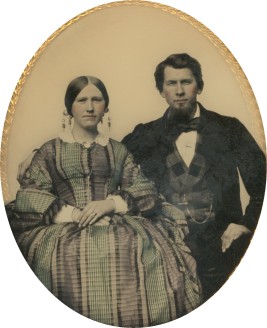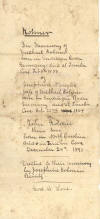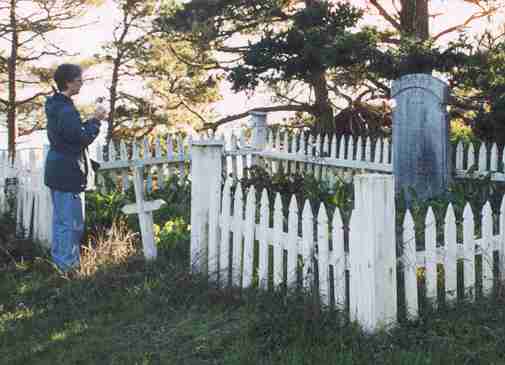 |
Kolmer Family | Page last modified: |

ca.1850-1855
Josephine K. Benitz collection
(Source: John C. Benitz)
Michael was the youngest child of Josef Kolmerer and Katharina Hödle. He was born on 4 October, 1804, in Endingen- im-Breisgau, Grand Duchy of Baden, Germany, and was baptised Franciscus Michael Kollmer. Josefa was older than Michael; she was born on 8 March, 1799 in Endingen and was baptised Maria Josefa Wagnerer (Wagner with the German “er” female suffix). They married on 18 September, 1828, in Endingen.
We have few verifiable facts about their early years, such as: where they lived, how they made their living, or if they had other children who died young – e.g. there was enough time between the births of son Xaver (b. 1831, d. 1832) and son John (b. 1836) for them to have had another child.
Much of what we know of their early years comes from the biography of their grandson, Alfred Benitz, written after he died (1937). According to Alfred’s biography, the Kolmer family emigrated from Germany to the US in 1833 – when their daughter Josephine was 3 years old. They lived in North Carolina for at least three years. According to US census records, their son (John) and youngest child (Caroline) were both born there, 1836 and 1838, respectively. (John’s tombstone has North Carolina as his place of of birth.)
Alfred’s biography is mistaken when it claims the Kolmers emigrated to California in 1841. However, the Kolmers may have begun moving west in 1841, but from North Carolina to St. Louis, Missouri. They were living in St. Louis when they decided to emigrate to Oregon on the west coast — in 1845.
In 1845, Michael and his young family were among the very first emigrants to travel by covered wagon overland to California. They are included (as Coleman) in the list of Emigrants to Oregon In 1845 compiled by Stephenie Flora. Per daughter Josephine’s recollections, they left from St. Joseph, Missouri. It is almost certain they joined one of four wagon trains bound for Oregon that left during early May. In early August, Michael (using the surname Coleman) is on record at Fort Hall, Idaho. In his recollections Henry Marshall mentions him with others who were persuaded by Caleb Greenwood to split off for California. They arrived at Sutter's Fort (Sacramento), California, on October 23rd. (H.H. Bancroft, in his “History of California”, included them as members of the Grigsby-Ide party.) It had taken them almost six months to cover the 2,000 miles (3,200 km) from Missouri. (For much more detail, click the Wagon-Train 1845 button at top.)
From the New Helvetia Diary we have concluded they stayed only one night at Sutter's Fort (23/24 Oct., 1845) then continued their journey, eventually wintering at Fort Ross. Almost for certain they were invited there by Wilhelm (William) Benitz, their fellow native from Endingen, Germany.
During their journey from Missouri to California in 1845 the Kolmers used the surname of Coleman. They probably began using that name earlier, maybe in an attempt to appear less foreign. However, we know from later documents that Josefa and her daughters were illiterate (or barely literate) and it is very possible that Michael was also. If so, they probably did not know how to spell their German surname and may have, for the sake of simplicity, accepted the similar sounding Coleman when it was bestowed upon them by English speakers. After arriving in California they apparently went by either name, Coleman or Kolmer, scattering both around quite impartially. Coleman Valley (near Occidental) and Kolmer Gulch (between Fort Ross and Timber Cove) are both named after them. In the Sonoma County registry of marriages, their daughters are recorded as Josephine Coleman (1847), and Caroline Colmen (1855). The spelling even varied on maps of Timber Cove; in 1877 son John is: J. Coleman, in 1898 he is: John Kolmer. However son-in-law Wilhelm Benitz always referred to them as Kolmer in his letters – he would have known its correct spelling from the old country. Kolmer is the surname used in Josefa’s 1865 will. The gravestone in the Benitz-Kolmer cemetery in Timber Cove, erected in 1898 (see below), has Kolmer as the surname.
According to the “History of Sonoma County” (published by Alley, Bowen & Co., San Francisco, 1880) and Amie Hill (Occidental village historian), in 1847 the Kolmers became the first emigrants to settle in the area of Occidental (30 miles south of Fort Ross). In late February of 1847, the witnesses to their eldest daughter's marriage (Josephine to Wilhelm Benitz) were early settlers of that area. The Kolmers leased part of the Bodega Rancho land grant from Captain Stephen Smith. The valley in which they lived and farmed, 2½ miles north-west of Occidental, became known as Kolmer Valley; its name was later changed to Coleman Valley (due to clerical error, per historian Amie Hill). They remained there only a few years, until about 1851. They were still there when the federal census (see Photos & Docs) was taken in late October, 1850. With the census' all too often lack of accuracy, they are listed as Mitchell, Mary, John, and Caroline Coleman — all supposedly born in Germany.

“History of Sonoma County, California” - page 201
published by Alley, Bowen & Co.
San Francisco, 1880
(Found by: Carlos Abarate)
NOTE: Original dates are off by one year. Likely wintered 1845 at Ft.Ross.
In 1851 their son-in-law, Wilhelm Benitz, gave them land to farm at Timber Cove, two miles north of Fort Ross (see Photos & Docs for excerpts from his letters and the census of 1852). We don't have a written record of why Wilhelm gave them the land or why the Kolmers decided to move from Coleman Valley. However, we can speculate...
There are several possible scenarios, but this seems the most plausible: At that time Fort Ross was very remote and the lifestyle unforgiving. Their daughter, Josephine, had lost her first three children. It is easy to imagine how Josephine — and Wilhelm — would have wanted to have her mother close by for support and assistance with her fourth child, Franz (Frank), born in May, 1850. It is also easy to imagine how Wilhelm, like many husbands, would tire of having his mother-in-law living in his house for an extended period. Giving the Kolmers a couple hundred acres to farm near by was an ideal solution. It benefited both families. To Wilhelm, the farm was a tiny part (less than 2%) of his Fort Ross property and it provided a barrier to squatters on his northern border. To the Kolmers who leased in Coleman Valley it meant they would own their farm in Timber Cove. It could not have been a hard decision to make, by either party.
The Kolmers were living in Timber Cove in 1855 when their youngest daughter, Caroline, impulsively and without her father’s permission married William “Dutch Bill” Howard of Occidental. In his fury, Michael tossed all of Caroline's possessions out of the house and burnt them.
We don't know what Michael cultivated on the flatter areas of his farm but from later photos, taken in the 1890's, it appears to be mostly pasture for grazing.
Michael's son-in-law, Wilhelm (William) Benitz, mentions the Kolmer family in letters to his brothers in Pittsburgh and Endingen:

Kolmer Headstone
(Source: John C. Benitz)

Benitz-Kolmer Cemetery
Timber Cove, Calif.
(René Benitz, Dec.'01)
Michael Kolmer died of a stroke at the farm on 12 February, 1858, apparently brought on by drink which had also ruined his finances. Josefa died there on 22 February, 1865, illness unspecified. They are buried in what has become known as the Benitz cemetery at Timber Cove. Several other people (maybe as many as 25 per a 1951 newspaper article, see below) were buried there as well but the only gravestone that survives today was installed in 1898 by Josephine K. Benitz in memory of her parents and brother, John. On that stone, Josefa’s maiden name of Wagner is misspelt as Wanger. Lest you think it was the stone mason’s error, see the instructions in the image included here. (Our guess: it was misspelt by one of Josefa’s grand-daughters, Hattie or Katie Benitz. They accompanied Josephine during her visit to California in 1898.)
In her will, Josefa Kolmer makes no mention of the farm where she lives, nor makes any mention of or bequest to her eldest daughter, Josephine K. Benitz. As to the farm, it is not clear from Wilhelm’s letters what was the original agreement by which he gave the farm to Michael Kolmer to live on but it appears to have remained Wilhelm’s property. Josefa signs with a mark and not a written signature, which strongly suggests she was illiterate.
We transcribe her entire will here. You may click on the images (to enlarge them) and read the original as recorded by the probate judge — his statement is the last page (we didn't transcribe it).
In the Name of God, Amen, I Josepha Kolmer, of the Township of Salt Point, in the County of Sonoma, and State of California, being afflicted by sickness, in full possession of mind and memory, and knowing the uncertainty of this life, and desiring to dispose of my worldly affairs, I ordain this my last will as follows.
1st I give and bequeath to my daughter, Caroline Howard, now residing in Kolmer Valley, in the County of Sonoma and State of California, all my horned cattle with the exception of four yoke of work oxen. I also give and bequeath to my said daughter, Caroline, one yellowish rone [sic] horse, branded K, one sorrel mare, branded thus H, my wearing apparel, one bed complete, one trunk and my arm chair.
2nd I desire that all the money I have on hand shall, upon my death, be taken in charge by my executor, hereinafter named, to be by him used in paying any debts I may have, expenses of my sickness included. In case there should not be money enough belonging to me to meet such demands, the executor will retain enough of the general property to make up the deficiency.
3rd The rest of my property, including the four yoke of work oxen I give and bequeath to my son John Kolmer now residing with me.
4th I appoint J. Helmke of Salt Point Township in the County of Sonoma and State of California my executor of this my last will and testament.
In witness whereof I have hereunto subscribed my name and affixed my seal at the township of Salt Point in the County of Sonoma and State of California this third day of February, 186
[Mark]
On this third day of February, one thousand eight hundred sixty five, the foregoing will was read to the said Josepha Kolmer and executed by her in the presence of us and each other, and declared by said Josepha Kolmer to be her last will and testament and we subscribed our names as witnesses thereto at her request, in the presence of said Josepha Kolmer and each other.
[signatures]
Fort Ross febr 12. 1858.
Mr Will Howard
Early this morning we heard the sad news of the death of your father in law, Mr Kolmer, who died during the night.
I send you notice yesterday through Mr Palmer about his sickness and begged you to send the doctor but he will now be too late for him.
I beg you to communicate this sad event to your Lady and remain yours
respectfully
W. Benitz
P.S.
The funeral of Mr Kolmer will take place on Sunday morning and should I like to see you attend if possible
W.B.
It is intriguing to speculate why Wilhelm Benitz's tone in his letter to Dutch Bill Howard advising of their father-in-law’s death appears rather formal and abrupt. It could have been his style, but it might also suggest a certain coolness between them.
© Peter Benitz (Benitz Family)